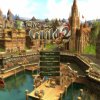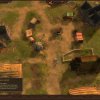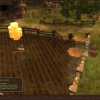The Guild 2 is a follow-up to the medieval life simulation Europa 1400: The Guild. In essence the player is given ability to build and maintain a dynasty in the setting of medieval Europe of the fifteenth century. While climbing the social ladder the player is free to use a vast assortment of tricks and methods to attain titles and profit. Players will have to build or buy property, hire craftsmen, recruit henchmen, bribe town’s officials, attain various titles, engage in a courtship ritual, raise a child, blackmail the members of opposing dynasties, charging them with crimes and many more. For each earned achievement (e.g. marrying) the player will be awarded experience points that can be allocated to various stats much like in fashion of RPGs. Another similarity to RPG genre is the leveling system. On certain levels players will have to choose a specific feat that will somehow affect player’s character personal stats.
The game doesn’t have any kind of a storyline. Instead the players are offered four game modes. Three of them challenge the player by imposing specific victory conditions (e.g. Get Rich, Time Limit, Attain a Major Title and so on). The fourth mode, however, has no victory requirements whatsoever. The game will continue as long as the player’s dynasty exists. This mode allows players to attain the highest possible status for his house, because even if the main character dies, his heirs (if conceived beforehand) will continue to build upon their father’s work .
At the beginning of each game the player will be offered to make a major choice in choosing a carrier for his dynasty. There are four classes in total, each of them representing a specific area of expertise with its own set of buildings. Craftsmen are concerned with manufacturing, making tools, selling goods at the market and so on. Patrons take interest in everything related to production and consumption of food. Scholars are devoted theologists and alchemists. And Rogue is perfect choice for those preferring a shady businesses of robbery, burglary, assassination and blackmail.
The control scheme has more in common with the RTS genre than with RPGs. The Player can move independently of his character around the town and enter various buildings. However certain actions (e.g. applying for a title) must be performed only with the presence of the player’s alter-ego. The game offers seven tutorial courses that will help new players familiarize themselves with the interface and game mechanics.




